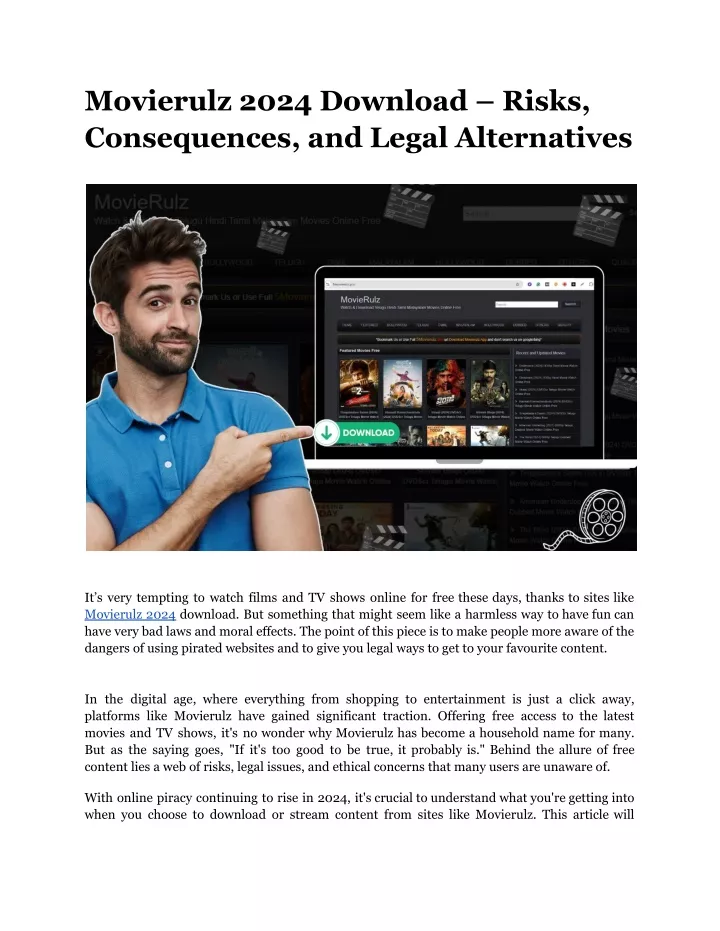Is movie piracy still a thriving industry in the digital age? The answer is an undeniable yes. Despite advancements in technology and increased awareness about intellectual property rights, illegal downloading and streaming platforms continue to thrive. One such platform that has gained notoriety over the years is Movierulz. Known for offering unauthorized access to Bollywood, Hollywood, and regional language films, Movierulz remains a contentious topic among cinephiles, filmmakers, and legal experts alike. This article delves into the workings of Movierulz, its implications on the entertainment industry, and why it poses significant challenges to creators worldwide.
Movierulz operates as a hub for pirated content, providing users with free access to movies across various genres and languages. While it may seem like an attractive option for those seeking cost-free entertainment, the consequences are far-reaching. By engaging with such platforms, users inadvertently contribute to the decline of legitimate streaming services and undermine the efforts of filmmakers who invest their time, resources, and creativity into producing high-quality content. In 2024 alone, Movierulz faced intense scrutiny from authorities due to its persistent violation of copyright laws. However, despite crackdowns and attempts to shut down the website, it continues to resurface under different domains, making it increasingly difficult to curb its activities.
| Category | Details |
|---|---|
| Name of Platform | Movierulz |
| Year Established | 2013 |
| Primary Function | Illegal streaming and downloading of movies |
| Languages Supported | Hindi, English, Tamil, Telugu, Kannada, Malayalam |
| Legal Status | Operating illegally; multiple shutdown attempts by authorities |
| Website Reference | movierulz.com |
One of the most alarming aspects of Movierulz is its ability to adapt swiftly to technological changes. For instance, the platform recently introduced Movierulz VPN, allowing users to bypass geo-restrictions and access blocked content effortlessly. This development has further complicated efforts to restrict its reach, particularly in regions where strict internet regulations exist. As a result, even individuals residing in countries with stringent anti-piracy laws can now stream or download pirated movies without much hassle. Such innovations highlight the platform's resilience and determination to evade legal repercussions.
On the flip side, there are legitimate alternatives available for consumers who wish to enjoy quality content legally. Platforms like Netflix have consistently been at the forefront of promoting original content while respecting copyright laws. In H1 2024, Netflix unveiled several anime TV series that garnered widespread acclaim, showcasing the potential of streaming services when they prioritize ethical practices. Similarly, collaborations between major studios and reputable distributors have resulted in innovative marketing strategies aimed at discouraging piracy. For example, during the launch of Squid Game Season 2, Netflix partnered with XOMedia and Monks to create immersive experiences for fans, including events featuring Pink Guards and Sydney Harbour activations.
The impact of Movierulz extends beyond just financial losses for production houses. It also raises serious ethical concerns regarding the exploitation of artists' work. Filmmakers, actors, writers, and technicians all depend on royalties and box office collections to sustain their careers. When viewers opt for pirated versions instead of supporting official releases, these professionals suffer directly. Moreover, the reliability of platforms facilitating illegal downloads comes into question, as they often expose users to malware and phishing attacks. Therefore, choosing such avenues over legitimate options not only compromises personal data security but also perpetuates a cycle of injustice against creative talent.
In recent years, Kannada cinema has witnessed a surge in popularity both domestically and internationally. Unfortunately, this rise in demand has also led to an increase in unauthorized sharing of new releases via websites like Movierulz. Movies released in 2024 were particularly affected, prompting discussions around the reliability and ethics of online film distribution channels. Industry stakeholders emphasize the importance of fostering partnerships between streaming platforms and production companies to ensure fair compensation for creators. They argue that investing in secure, user-friendly interfaces will eventually discourage people from resorting to piracy.
Telugu cinema too has experienced similar challenges. Blockbuster hits like Court (2025) faced issues related to unauthorized uploads shortly after their theatrical release. To address this problem, some filmmakers adopted hybrid models where films premiered simultaneously in theaters and on paid streaming platforms. While this approach did help mitigate some losses, it wasn't enough to completely eliminate piracy. Critics point out that unless stricter enforcement mechanisms are implemented globally, platforms like Movierulz will continue to flourish unchecked.
Technical difficulties associated with accessing Movierulz sometimes frustrate users, leading them to seek solutions such as updating browsers or switching devices. However, these temporary fixes do little to resolve the underlying issue of illegality. Instead, they encourage continued engagement with harmful practices. Google Chrome users, for instance, frequently report problems when trying to load Movierulz pages, which might stem from built-in security features designed to block malicious sites. Rather than troubleshooting these errors, users would benefit more from exploring authorized means of watching movies.
Finally, it is essential to recognize that Movierulz represents just one facet of a broader issue affecting the global entertainment sector. Other rogue websites operate similarly, capitalizing on consumer demand for affordable or free content. Addressing this challenge requires concerted efforts from governments, tech companies, and content creators working together to develop comprehensive strategies. These could include enhancing digital literacy programs, improving accessibility to affordable streaming services, and increasing penalties for violating copyright laws. Only through such collaborative initiatives can we hope to reduce the prevalence of piracy and promote a healthier ecosystem for artistic expression.



